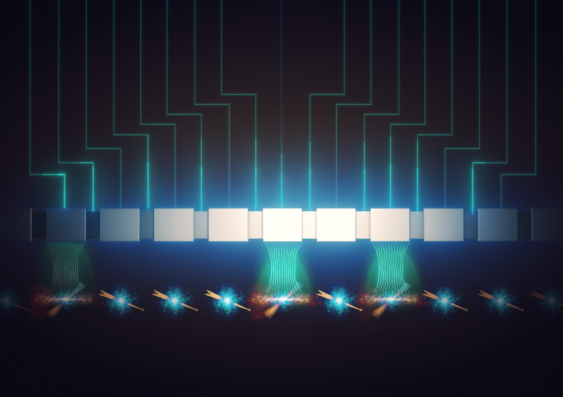║┌┴¤═°┤¾╩┬╝à quantum computing spinout wins industry award
2025-08-05T09:25:00+10:00

Diraq Chief Operating Officer Stefanie Tardo and Diraq founder and ║┌┴¤═°┤¾╩┬╝à Scientia Professor Andrew Dzurak at the NSW iAwards.
Photo: Tony Rosier
Diraq, a startup founded by ║┌┴¤═°┤¾╩┬╝à SydneyÔÇÖs Scientia Professor Andrew Dzurak, has been recognised at the 2025 NSW iAwards.
║┌┴¤═°┤¾╩┬╝à spinout┬ácompany has won the Technology Platform category at the prestigious NSW iAwards. The company, which was founded in 2022, aims to redefine scalable quantum computing and bring practical commercial applications to the world.
The iAwards, hosted by the , recognise and reward excellence in Australian innovation.
║┌┴¤═°┤¾╩┬╝à Engineering┬áScientia Professor Andrew Dzurak, also DiraqÔÇÖs founder and CEO, said the company was honoured to be chosen as the NSW winner of the Technology Platform iAward.
ÔÇ£It's important recognition of both┬áthe strength of AustraliaÔÇÖs quantum ecosystem and the commercial potential of the technology we are developing,ÔÇØ Prof. Dzurak said.
ÔÇ£At Diraq, weÔÇÖre focused on delivering utility-scale quantum computing using standard silicon chip manufacturing - an approach thatÔÇÖs both powerful and practical and will have┬áa transformative impact on the world.ÔÇØ
World-changing technology
Quantum computing is set to revolutionise industries and Australia is leading the way on its development. 
Distinct from classical computing, quantum harnesses the power of minute quantum interactions to tackle large, complex problems. It requires tailored algorithms, hardware and software specifically designed for quantum systems.  
Diraq is aiming to deliver scalable quantum via millions of quantum bits, the basic unit of information in quantum computing (or ÔÇÿqubitsÔÇÖ) on a single chip.
The company says consolidating quantum computing power onto one chip has advantages in terms of operational costs, power consumption and maintenance requirements.
Silicon qubit quantum processors
One of DiraqÔÇÖs key strengths lies in its innovative hardware,┬áconstructed using a novel technology known as spins in silicon,┬áwhich can act as qubits. The process was invented by Prof. Dzurak at ║┌┴¤═°┤¾╩┬╝Ã. ┬á
Using modified transistors, like ones found in conventional computers, DiraqÔÇÖs qubits can be built to scale in factories already making regular silicon chips. TheyÔÇÖre cost efficient, energy efficient and more powerful than qubits produced by competitors.
║┌┴¤═°┤¾╩┬╝à Deputy Vice-Chancellor Research & Enterprise, Professor Bronwyn Fox, said she was excited to see Diraq recognised for its leadership in innovation.
ÔÇ£This award is a powerful endorsement of ║┌┴¤═°┤¾╩┬╝ÃÔÇÖs commitment to research, development and commercialisation,ÔÇØ Prof. Fox said.
ÔÇ£It reflects the incredible potential of Australian quantum innovation and the impact it can have on the world stage. WeÔÇÖre proud to support researchers and startups like Diraq, who are translating world-leading research into future-defining technologies.ÔÇØ
Prosperity through innovation
The AIIA is a not-for-profit organisation aimed at supporting and advocating for AustraliaÔÇÖs future social and economic prosperity through technology innovation.
Simon Bush, AIIAÔÇÖs CEO, congratulated the NSW award winners, including Diraq.
ÔÇ£These projects highlight how digital tools can enhance safety, improve access to services, empower young people and support more sustainable and connected communities. The NSW tech sector continues to lead with creativity, purpose and impact.ÔÇØ
DiraqÔÇÖs win means the company is a finalist in the National iAwards┬áTechnology Platform category. Those awards will be held in Adelaide later this month, with finalists pitching their solutions live to a panel of judges.┬á
Media enquiries
For enquiries about this story and interview requests please contact Ashleigh Steele:
Tel: +61421308805
Email: ashleigh.steele@unsw.edu.au
Related stories
-

║┌┴¤═°┤¾╩┬╝à engineers help crack key challenge in scaling quantum computers
-

Quantum tech is a high-stakes gamble. HereÔÇÖs how Australia can find a way forward
-

║┌┴¤═°┤¾╩┬╝à engineers get quantum computing processors working at 20X warmer temperatures
-

New spin control method brings billion-qubit quantum chips closer


